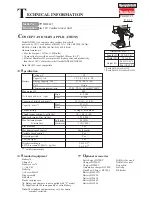
-3-
Safety Rules for Drivers
Hold tool by insulated gripping surfaces
when performing an operation where the
cutting tools may contact hidden wiring
or its own cord.
Contact with a “live” wire
will make exposed metal parts of the tool
“live” and shock the operator.
Do not drill,
fasten or break into existing walls or other
blind areas where electrical wiring may exist.
If this situation is unavoidable, disconnect all
fuses or circuit breakers feeding this
worksite.
Always wear safety goggles or eye
protection when using this tool.
Secure the material being fastened. Never
hold it in your hand or across legs.
Unstable support can cause the drill bit to
bind causing loss of control and injury.
Never leave the trigger locked "ON".
Before plugging the tool in, check that the
trigger lock is "OFF".
Accidental start-ups
could cause injury.
Position the cord clear of rotating driver.
Do not wrap the cord around your arm or
wrist.
If you lose control and have the cord
wrapped around your arm or wrist it may
entrap you and cause injury.
Be aware of the location and setting of
the switch "Lock-ON" button.
If the switch
is locked "ON" during the use, be ready for
emergency situations to switch it "OFF", by
first pulling the trigger then immediately
releasing it without pressing the "Lock-ON"
button.
Be prepared for a strong reaction torque
when "seating" or removing a screw.
The
driver motor housing will tend to twist in the
opposite direction when "seating" or
removing a screw.
Tool Use and Care
Use clamps or other practical way to
secure and support the workpiece to a
stable platform.
Holding the work by hand
or against your body is unstable and may
lead to loss of control.
Do not force tool. Use the correct tool for
your application
. The correct tool will do
the job better and safer at the rate for which
it is designed.
Do not use tool if switch
does not turn it “ON” or “OFF”.
Any tool
that cannot be controlled with the switch is
dangerous and must be repaired.
Disconnect the plug from the power
source before making any adjustments,
changing accessories, or storing the tool.
Such preventive safety measures reduce the
risk of starting the tool accidentally.
Store idle tools out of reach of children
and other untrained persons.
Tools are
dangerous in the hands of untrained users.
Maintain tools with care. Keep cutting
tools sharp and clean.
Properly
maintained tools, with sharp cutting edges
are less likely to bind and are easier to
control. Any alteration or modification is a
misuse and may result in a dangerous
condition.
Check for misalignment or binding of
moving parts, breakage of parts, and any
other condition that may affect the tools
operation. If damaged, have the tool
serviced before using.
Many accidents are
caused by poorly maintained tools. Develop
a periodic maintenance schedule for your
tool.
Use only accessories that are
recommended by the manufacturer for
your model.
Accessories that may be
suitable for one tool, may become
hazardous when used on another tool.
Service
Tool service must be performed only by
qualified repair personnel.
Service or
maintenance performed by unqualified
personnel could result in a risk of injury. For
example: internal wires may be misplaced or
pinched, safety guard return springs may be
improperly mounted.
When servicing a tool, use only identical
replacement parts. Follow instructions in
the Maintenance section of this manual.
Use of unauthorized parts or failure to follow
Maintenance Instructions may create a risk
of electric shock or injury. Certain cleaning
agents such as gasoline, carbon
tetrachloride, ammonia, etc. may damage
plastic parts.
BM 3609929656 10/03 10/17/03 12:13 PM Page 3




































